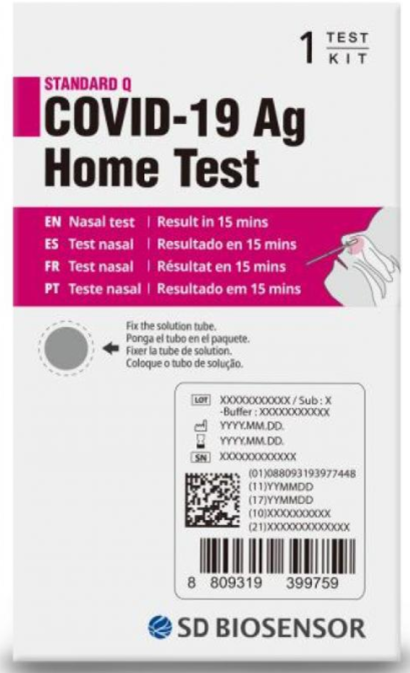Date Issued: March 1, 2022
The U.S. Food and Drug Administration (FDA) is warning people not to use the SD Biosensor Inc. STANDARD Q COVID-19 Ag Home Test. The test is not authorized, cleared, or approved by the FDA for distribution or use in the United States. The FDA is concerned about the risk of false results when using this unauthorized test. This unauthorized test may be packaged in a white and magenta box (see image below).
The FDA has not received reports of injuries, adverse health consequences, or death associated with use of the SD Biosensor STANDARD Q COVID-19 Ag Home Test.
Recommendations
Do not use the STANDARD Q COVID-19 Ag Home Test.
- Test users and caregivers: Talk to your health care provider if you think you were tested with the STANDARD Q COVID-19 Ag Home Test and you have concerns about your test results.
- Health care providers and testing program organizers: If an antigen test was performed less than two weeks ago using the STANDARD Q COVID-19 Ag Home Test, consider retesting your patients using an FDA authorized or cleared SARS-CoV-2 diagnostic test if you suspect an inaccurate result. If testing was performed more than two weeks ago and there is no reason to suspect current SARS-CoV-2 infection, it is not necessary to retest.
- Report any problems you experience with the STANDARD Q COVID-19 Ag Home Test to the FDA, including suspected false results. See Reporting Problems with Your Test.
Test Descriptions
- The unauthorized SD Biosensor STANDARD Q COVID-19 Ag Home Test uses a nasal swab sample to detect proteins, called antigens, from SARS-CoV-2, the virus that causes COVID-19.
- The SD Biosensor COVID-19 At-Home Test, authorized by the FDA on December 24, 2021, is a different test and is not the subject of this Safety Communication. The authorized test is distributed by Roche and can continue to be used.
Risks of False Test Results
- A false-negative antigen test result means that the test says the person does not have COVID-19 but they actually do have COVID-19. A false-negative result may lead to delayed diagnosis or inappropriate treatment of SARS-CoV-2, which may cause people harm including serious illness and death. False-negative results can also lead to further spread of the SARS-CoV-2 virus, including when people are housed together in health care, long-term care, and other facilities based on these false test results. When false negative test results are received, actions to limit exposure to an infected person might not be taken, such as isolating people, limiting contact with family and friends, or limiting access to places of employment.
- A false-positive antigen test result means that the test says the person has COVID-19 but they are actually do not have COVID-19. A false-positive result may lead to a delay in both the correct diagnosis and appropriate treatment for the actual cause of a person’s illness, which could be another life-threatening disease that is not COVID-19. False-positive results could also lead to further spread of the SARS-CoV-2 virus when presumed positive people are housed together.
FDA Actions
The FDA regularly monitors the marketing of unauthorized, unapproved, or uncleared tests, including reports of problems with test performance or results. The FDA is working with SD Biosensor Inc. to resolve this safety issue.
SD Biosensor, Inc. has initiated a recall for all unauthorized SD Biosensor STANDARD Q COVID-19 Ag Home Tests that were distributed in the U.S..
The FDA will continue to keep the public informed of significant new information.
Reporting Problems with Your Test
If you think you had a problem with a SARS-CoV-2 test, the FDA encourages you to report the problem through the MedWatch Voluntary Reporting Form.
Health care personnel employed by facilities that are subject to the FDA's user facility reporting requirements should follow the reporting procedures established by their facilities.
Questions?
If you have questions about this Safety Communication, email the Division of Industry and Consumer Education (DICE) at DICE@FDA.HHS.GOV or call 800-638-2041 or 301-796-7100.

No comments:
Post a Comment